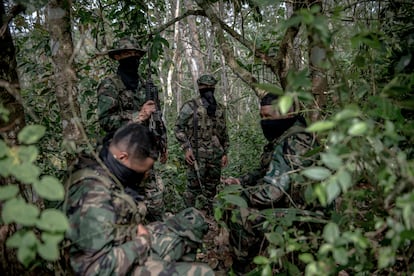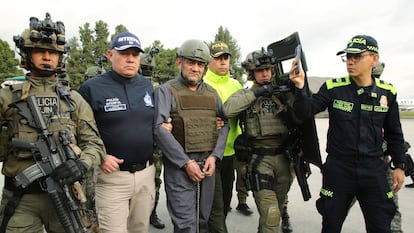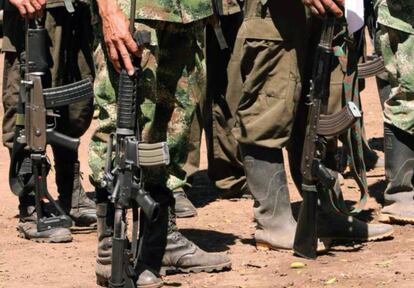Colombia’s raw wounds of war
Otoniel, the ex-leader of the Gulf Clan, was sentenced in the US on the same day that former paramilitary commander Hernán Giraldo was expelled from the country’s justice and peace process


On August 8, two news stories highlighted the enduring impact of the seemingly endless war in Colombia. First, a New York judge sentenced Dairo Antonio Úsuga (alias Otoniel) to 45 years in prison for drug trafficking. Hours later, Colombia’s transitional justice system established in 2005 expelled former paramilitary commander Hernán Giraldo due to his ongoing involvement in criminal activities. Giraldo committed gender-based violence against four minors in 2007 and 2008, while he was imprisoned in Colombia. Despite an 18-year effort to demobilize illegal paramilitary groups — drug trafficker armies, land grabbers, peasant self-defense groups and more — the scars they left behind in Colombia have yet to heal. Úsuga, Giraldo and many others perpetuated recurring waves of violence that journalist María Teresa Ronderos describes as recycled wars.
Hernán Giraldo was born in a part of Colombia heavily affected by the mid-20th century civil war between liberals and conservatives, known simply as “La Violencia” — The Violence, in stark capital letters. He attended school until the second grade, when his family had to flee the area due to the conflict. A landless peasant, Giraldo moved to the Caribbean coast and settled in the foothills of the Sierra Nevada de Santa Marta in 1969. He made money by capitalizing on the region’s marijuana boom and began buying up farms. Giraldo soon butted heads with the now-extinct FARC guerrilla army and lost his son and son-in-law in a 1986 guerrilla attack. This led him to establish his own paramilitary army funded by drug trafficking. He eventually aligned with the United Self-Defense Forces of Colombia (AUC) and demobilized in 2005 during the peace talks. That was also the year he and his brother, Jesús Antonio, were extradited to the United States on drug trafficking charges.
Dairo Úsuga is the heir to the throne of the United Self-Defense Forces of Colombia (AUC), an alliance of illegal paramilitary groups. Born in the conflict-ridden area of Urabá to a peasant family, he joined the Maoist guerrilla group called the Popular Liberation Army (EPL) at 16. After the 1991 peace agreement, he joined a paramilitary group headed by two brothers — Carlos and Vicente Castaño — rising through the ranks and refusing to demobilize in 2005. Inheriting control of drug trafficking routes and battle-hardened soldiers, he and other leaders formed the group known as Los Urabeños, the Gaitanista Self-Defense Forces of Colombia, or the Gulf Clan. After his brother was killed during a police raid in 2012, Úsuga became the sole leader. He was captured near the Panama border in late 2021 and extradited to the United States by then-President Iván Duque in May 2022.

Both men left a bloody trail of victims who persistently seek justice and restitution. After serving an eight-year prison sentence in the United States, he was deported to Colombia in 2021. Two years prior, the Chamber of Justice and Peace of the Barranquilla Court had handed him and other members of their group the longest sentences ever imposed in Colombia — 40 years in prison — for a range of crimes including forced conscription, murder, disappearance, forced displacement, illegal financing and gender-based violence. “The sexual violence perpetrated by the former commander of the self-proclaimed Tayrona Resistance Bloc — Hernán Giraldo Serna — served as both a means of sexual gratification and as a strategy for social control,” stated the 9,000-page sentencing document.
Giraldo victimized an estimated 67,000 people, including hundreds of women. He is thought to have fathered around 35 children, many of them as a result of rape. Colombia’s attorney general alleged that most of the mothers abused by Giraldo were under the age of 14, and the youngest became pregnant at 12. At the request of a prosecutor from the Transitional Justice Directorate, a Barranquilla court expelled Giraldo from the justice and peace process for violating the commitments and eligibility requirements established in 2005. Prosecutors proved that Giraldo committed crimes of gender-based violence against four minors between 2007 and 2008 when he was in various Colombian prisons.
“When I was 15, I arrived in Santa Marta and met this woman. She invited me to stay with her, helping with housework and taking care of the kids. In return, she supported my studies, provided me a place to live, and even bought the things I needed,” said one of the victims. “One day she told me to accompany her on a prison visit.” At the jail, she was taken to Giraldo’s cell. “He took off my clothes and had sex with me. I remember that I cried and thought, ‘God help me because this man is going to die on top of me,’” stated the sworn testimony of one victim.

Úsuga also victimized thousands through murder, terrorism, kidnapping, sexual crimes, illegal mining operations and more. He unsuccessfully tried to avoid extradition through numerous legal maneuvers. Like Giraldo, Úsuga raped and terrorized hundreds of women and minors through an international network of human trafficking. These deep wounds from Colombia’s long-running war remain unhealed for the countless unknown victims of crimes committed by Giraldo, Úsuga and many others that follow in their footsteps.
Sign up for our weekly newsletter to get more English-language news coverage from EL PAÍS USA Edition
Tu suscripción se está usando en otro dispositivo
¿Quieres añadir otro usuario a tu suscripción?
Si continúas leyendo en este dispositivo, no se podrá leer en el otro.
FlechaTu suscripción se está usando en otro dispositivo y solo puedes acceder a EL PAÍS desde un dispositivo a la vez.
Si quieres compartir tu cuenta, cambia tu suscripción a la modalidad Premium, así podrás añadir otro usuario. Cada uno accederá con su propia cuenta de email, lo que os permitirá personalizar vuestra experiencia en EL PAÍS.
¿Tienes una suscripción de empresa? Accede aquí para contratar más cuentas.
En el caso de no saber quién está usando tu cuenta, te recomendamos cambiar tu contraseña aquí.
Si decides continuar compartiendo tu cuenta, este mensaje se mostrará en tu dispositivo y en el de la otra persona que está usando tu cuenta de forma indefinida, afectando a tu experiencia de lectura. Puedes consultar aquí los términos y condiciones de la suscripción digital.








































